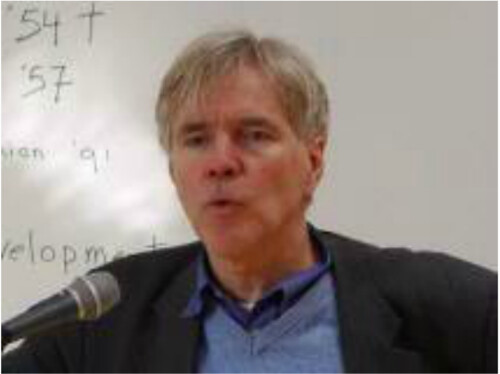Bergen aan Zee, The Netherlands - Dr. Willem van Eekelen and Dr. Meine Pieter van Dijk were the principal speakers at a UPF conference on the importance of Security and Development and Economy as Conditions for Peace on March 8, 2008 at Huize Glory, Bergen aan Zee, North Holland.
This was part of a UPF European Leadership Conference introducing the principles and activities of the Universal Peace Federation.
Dr. van Dijk's talk, “Economy and Peace,” was mainly based on Oxford University Professor of Economics Paul Collier's book Bottom Billion. Dr. Collier maintains that of the six billion people in the world, two billion are in rich countries, one in countries that are not developing, and three somewhere in the middle. Collier urges a focus on the "bottom billion" for four reasons:
- The conflict trap. Conflict may be caused by politics or ethnic divisions, but the underlying problem is usually economic. If people are desperately poor, they join a group, even a military one, that promises a better life; and conflict leads to cycles of violence.
- The natural resource trap. The abundance of natural resources can be as much a curse as a blessing because it can lead to corruption and to large government spending that cannot be sustained indefinitely. Easy income from natural resources discourages manufacturing.
- Landlocked with bad neighbors. Dr. Collier recommended that such a country might improve its relationship with neighbors and become a "haven in the region."
- Bad governance. Impetus for change needs to come from within. The higher the percentage of citizens with a secondary education, the more likely a country a country will achieve a sustainable turnaround.
Dr. Van Dijk cited examples from Zimbabwe, Bangladesh, Chad, and Tanzania. Africa had failed to develop jobs in export manufacturing and needs access to European markets. Globalization benefited China and India more than other countries, and Asia's success has made it harder for Africa to develop. He recommended helping countries develop effective laws and revising trade policies to reduce marginalization
In response to a question about Africa, Dr. Van Dijk emphasized that he was an "Afro-optimist." He expressed concerns that countries with large debts that had been forgiven may start to borrow heavily again. While water scarcity is a concern, he cited the rapidly-lowering cost of desalinization technology. He gave the impression that if human ingenuity and honest public service are encouraged, there is room for optimism.
Dr. Willem van Eekelen, who spoke on “Security and Development as Conditions for Peace," has a distinguished record as a diplomat, parliamentarian, and government minister of defence.
He has seen huge changes in India since he was Ambassador for the Netherlands in the 1950s. It had then been thought that India would never be able to feed itself, but with three times the population, there seems to be enough food. He had also served in Africa, and commented about the lack of basic infrastructure. It was difficult to develop if farmers could not easily get to market.
He described the difficulty of addressing security issues when governments to not want "interference" from outside. Kofi Annan spoke of the "responsibility to protect". But, Dr Van Eekelen asserted, if you start an intervention, you need to envisage a future leading to stabilization and development, including ensuring good governance.
Dr. Van Eekelen addressed development using examples from Europe after World War II. The 1950 Coal and Steel Community addressed the problem of energy shortage by putting it in a wider context and setting up a system for mutual benefit. The present “communitarian model” of the EU helps avoid disagreements among nations.
When asked how the EU might help resolve the impasse in Israel/Palestine he referred to his experiences durng MEPI peace trips and suggested that both sides consider taking a first step, such as ceasing to build settlements and fire rockets. Then discussion on boundaries could begin. He called the return of refugees and status of Jerusalem the thorniest issues.
Compliments and questions then came thick and fast. Even though Saddam was a dictator, was the damage justified? What if democracy leads to disintegration of states? The US was unprepared for the Shia-Sunni-Kurd conflicts. Fundamentally the problem is that Iraq was an artificial construction, a result of carving up the Ottoman Empire after World War I. Yugoslavia had also been an artificial creation after World War I, held together by Tito's maneuverings.
Pakistan, India, and Afghanistan were also discussed, Dr. Van Eekelen suggesting ways through the complexities and dilemmas. He appreciated how a great man can bring a big change, as Anwar Sadat had done in signing a peace agreement with Israel
A new Ambassador for Peace, Bruce Cerew, spoke about experiencing many of the "horrors of human abuse and war experienced by people who fall through the cracks of global society." He has written a fictionalized account, War Child, about his experiences in Africa and making his way to The Netherlands in hopes that his work "will reach the inner souls of my audience and make them allies in my fight against the atrocities against asylum seekers, child abuse, and women's rights in Africa and beyond."
This conference, the fourth and last of the 2007/8 winter series in The Netherlands, was "the best and most joyful," said Wim Koetsier, UPF-Netherlands Secretary General. People talked about feeling like they had come home, and some were in tears as they parted.

